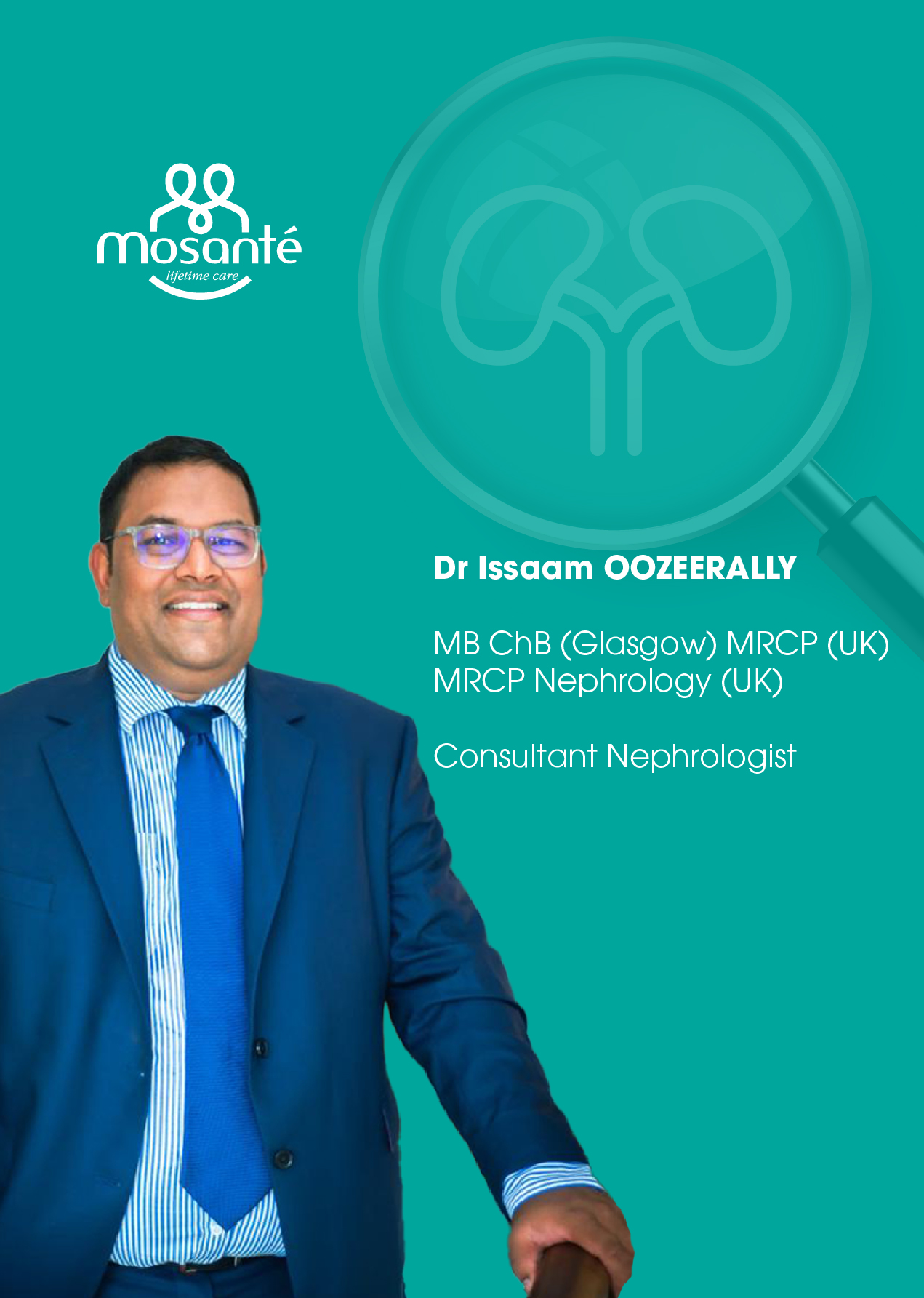
- What are the main causes Kidney Failure in Mauritius?
Poorly controlled Diabetes Mellitus; irrespective of the type whether 1 or 2; and High Blood Pressure (Hypertension) are the main causes.
The Mauritius Non-Communicable Disease (NCD) survey undertaken in 2015 by the Ministry of Health and Wellness estimated that the prevalence of type 2 diabetes in the 20-74 age group was 20.5%. The figures for pre-Diabetes in the same age group in the same survey was 19.4%. NCD 2015 survey also found that the prevalence of Hypertension was 28.4%. Unfortunately, roughly half (52.6%) of these patients were actually on treatment.
Other common causes of Kidney Failure include: Cardiovascular Disease, Kidney Stones, recurrent kidney infections, use of non-steroidal anti-inflammatory drugs [NSAIDS] and Prostate enlargement.
NCD reports can be found on the following link:
https://health.govmu.org/Pages/Statistics/NCD-Survey-Reports.aspx
- How is Kidney Disease diagnosed? How is it classified?
Kidney Failure is poor kidney function. It is called “Urée” in Creole and is diagnosed with the blood tests called urea and creatinine. The latter rises as kidney function declines. Creatinine levels are used to estimate the kidney function with a formula called the Estimated Glomerular Filtration Rate (eGFR) which is then classified into five categories shown below:

Kidney Disease can be accompanied by the presence of protein (including albumin) in the urine. Generally, it is one of the first signs that Diabetes is affecting the kidney. The amount of protein/albumin lost in the urine progressively increases as the damage caused by the diabetes increases. Eventually, this leads to a decline in the kidney function.
The presence of albumin is monitored by requesting for a urine sample for ACR (albumin-to-creatinine ratio). Please find a table summarising different categories of ACR:

- What are the steps that a person can take to avoid Kidney Failure?
In the Mauritian context, it is of paramount importance to actively look for any presence of Diabetes and High Blood Pressure. Treating these two underlying conditions will help reduce the development of Kidney Disease.
- How can prevent Kidney Failure?
- Adherence to the prescribed medical therapy
- Some people in Mauritius tend to stop the blood pressure medication once the blood pressure is under control. It has to be understood that non-adherence to the therapy will result in treatment failure.
- Regular blood sugar testing should be done at home if being treated for Diabetes. Poorly controlled Diabetes will lead to Kidney Disease.
- Healthy Consumption.
- Some patients are prescribed a fluid intake restriction for Kidney Failure or Heart Failure.
- Preference for home cooked meals with low in salt and fat content
- Physical activity is encouraged.
- Quit Smoking.
- Avoid regular use of non-steroidal anti-inflammatory agents.
- An active monitoring needs to be put in place with regular monitoring of blood and urine tests and medication review. This can be done with your doctor.
- What are the complications of Kidney Failure and when should dialysis treatment be considered?
Kidney Failure is associated with the following complications: Anaemia, electrolyte abnormalities (e.g. potassium levels are high), bone disease, fluid overload (the patient is swollen with fluid retention) and an increased risk of cardiovascular disease.
Generally, discussions about dialysis with the patient need to be undertaken when the eGFR is less than 20. However, starting dialysis is a joint discussion between the nephrologist, patient and patient’s relatives. Blood test results, clinical examination, response to medical therapy and patient’s symptoms are the main deciding factors here. This is true for initiating dialysis in the chronic setting. In the acute setting; as in acute kidney failure, the approach is different focusing mainly on the emergency aspect.
Haemodialysis is a form of renal replacement therapy. It is usually performed in a dialysis centre. One treatment lasts 3-4 hours. It needs to be done thrice weekly. The patient stays connected to the dialysis machine during this time and the patient’s blood is purified throughout a circuit connected to the machine. The patient’s blood is removed via a dialysis catheter (plastic tube usually placed at the neck or groin) or through an arteriovenous fistula. The latter is a surgically made connection being the patient’s artery and vein usually at the wrist or elbow.
Conclusion
The consequences of kidney failure bear a heavy cost on the individual, his/her family and on society. Active surveillance from both patient and doctor is required. Blood and urine tests are essential. If the eGFR is less than 30, one should be under the care of a nephrologist.
The Renal Association of Mauritius is a useful resource. Please visit the website www.renal.mu for information under the public info section.
About Dr Issaam OOZEERALLY
MB ChB (Glasgow) MRCP (UK) MRCP Nephrology (UK)
Consultant Nephrologist
Dr Oozeerally graduated from the University of Glasgow in 2008. After completing his internship of two years in Scotland, he moved to England to complete his MRCP in 2012. Following this, he started his training in Nephrology and General Internal Medicine in 2013 in Leicester and the East Midlands which he completed in 2018. After that, he decided to return to Mauritius as there is a lack of Nephrologists here. He remains registered with the General Medical Council of the UK as a Nephrologist.
In Mauritius, he started working in a dialysis unit in Quatre Bornes for a few months in September 2018. Subsequently from February 2019 to December 2021, he worked as a Nephrologist for the Ministry of Health and Wellness based at Jawaharlall Nehru Hospital. Since January 2022, he is a Self-employed working across different sites in the private healthcare sector.

